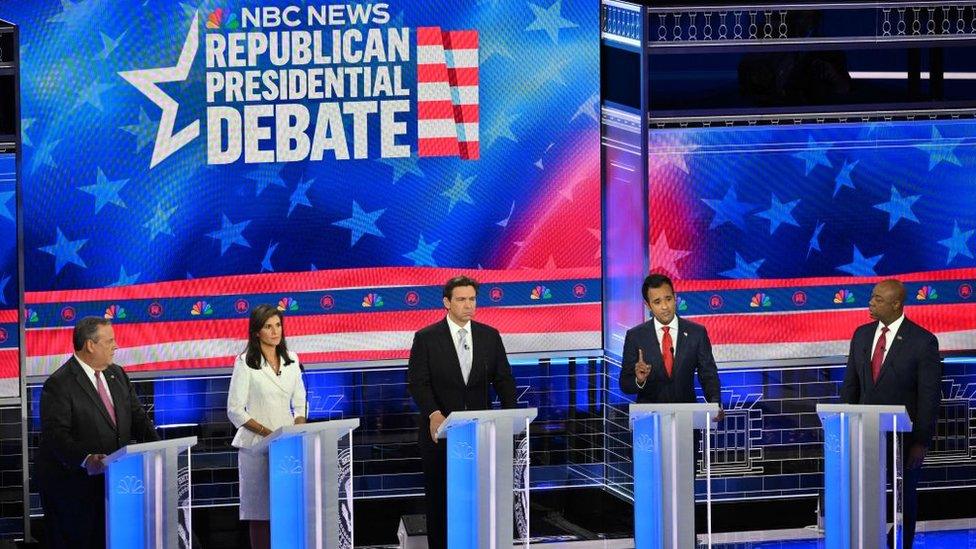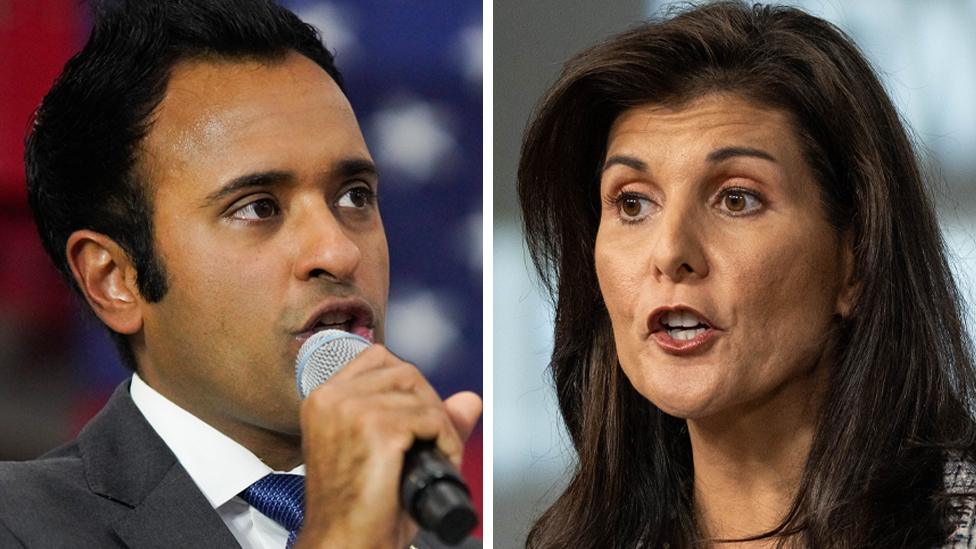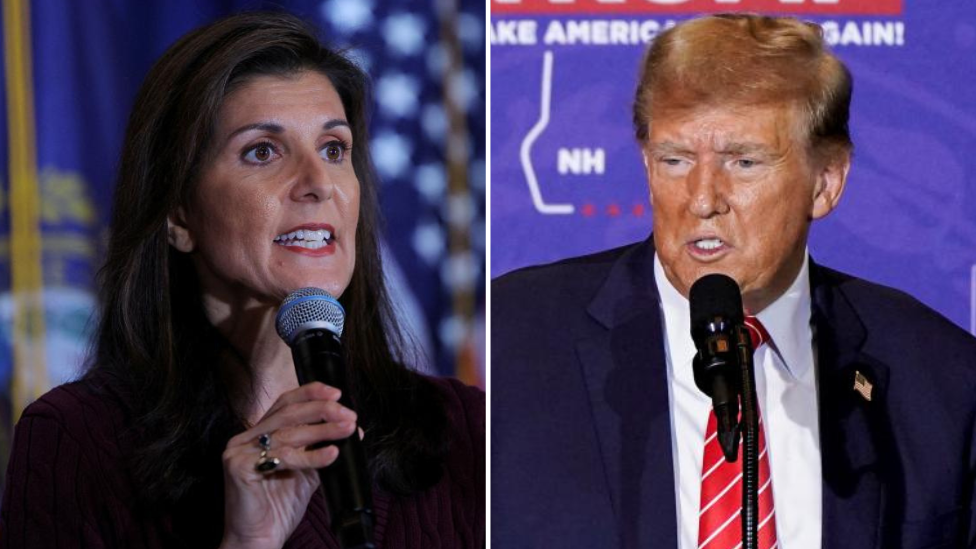Third Republican debate: Five candidates take to stage in Miami
- Published

Five presidential candidates have taken to the stage in Miami for the third Republican debate. But once again frontrunner Donald Trump is not in attendance.
The debate field has continued to narrow as the criteria to make the stage, as set by Republican Party leadership, gets tougher.
The candidates will be looking to solidify support before the first real contest in the Republican nomination process, the Iowa caucus, on 15 January.
Who's on stage?
To qualify, candidates needed at least 4% support in two national polls, or 4% in one national poll as well in two polls from four of the earliest states in the nomination contest: Iowa, New Hampshire, Nevada and South Carolina.
Additionally they had to have 70,000 individual campaign donors geographically dispersed around the country and to sign a pledge promising to support the eventual Republican nominee.
The five candidates who the Republican party said met all the criteria are:
Florida Governor Ron DeSantis
Businessman Vivek Ramaswamy
Former South Carolina Governor Nikki Haley
South Carolina Senator Tim Scott
Former New Jersey Governor Chris Christie
Seven candidates were on stage for the last debate. Former Vice President Mike Pence has since dropped out, and North Dakota Governor Doug Burgum did not qualify this time around.
Mr Trump has consistently said he will not debate his rivals, and on Wednesday night he will engage in a little counterprogramming, holding a rally at a football stadium about a half-hour drive away.
When and where is the debate?
The two-hour debate began at 20:00 Eastern (01:00 Thursday GMT) at the Adrienne Arsht Center for the Performing Arts of Miami-Dade County. It's being broadcast on US television by NBC and on radio by conservative Christian network Salem. Online the debate is being livestreamed by video site Rumble and translated into Spanish by Telemundo.
The moderators are NBC journalists Kristen Welker and Lester Holt, along with Salem radio host Hugh Hewitt.
The Republican Jewish Coalition is also one of the debate partners and the conflict in the Middle East is likely to be one of the subjects of discussion, along with the economy, immigration and of course Mr Trump himself.

More on the US election
Explained: A simple guide to the US 2024 election
Republicans: Who are the challengers to Trump?
Policies: What a Trump second term would look like
Voters: 'It's like 2020 all over again - with higher stakes'

What's at stake?
Ms Haley, 51, impressed some voters during the first two debates, and now stands third in most polls behind second-place Mr DeSantis.
The only woman in the race, she served as ambassador to the UN under Mr Trump, and has tried to portray herself as a relative moderate with extensive foreign policy experience.
Mr DeSantis, 45, has mostly shied away from attacking the former president, although during the last debate in September he hinted at a change in strategy, saying: "Donald Trump is missing in action. He should be on this stage tonight."
After 38-year-old Mr Ramaswamy received a surge of early enthusiasm, other candidates have sniped at his lack of political experience. In one of the sharpest lines from the last debate, Ms Haley criticised his use of TikTok, calling the Chinese-owned app "dangerous".
"Every time I hear you, I feel a little bit dumber for what you say," she told him.
Mr Ramaswamy defended himself, saying he was trying to reach "the next generation of young Americans where they are."

Vivek Ramaswamy and Nikki Haley exchanged jabs at the two previous debates
Mr Scott, 58, the only African-American in the race, garnered some attention during the last debate with his comments about race.
"There is not a redeeming quality in slavery," he said, criticising Mr DeSantis' education policies in Florida, where new guidelines suggested that there were personal benefits for slaves who developed skills.
"America is a great country because we have faced our demons in the mirror and made a decision," Mr Scott said, before going on to criticise Democrat-backed social welfare programs.
Mr Scott's comments were lauded by conservative commentators, but have not translated into a significant boost in the polls.
Mr Christie, 61, has been pitching himself as a staunch opponent of Mr Trump and called him "Donald Duck" last time for sitting out the debates. He'll almost certainly continue his line of attack, but he too languishes near the back of the pack.
The stark reality for the challengers is that time is quickly running out for any of them to make real inroads into Mr Trump's lead.
A polling average compiled by the RealClearPolitics website puts Mr Trump's support among Republicans at around 58%.
That's more than 44 points ahead of his nearest challenger, Mr DeSantis.
And the former president's support among Republican voters has held very steady - it's been above 50% since April, according to polling website FiveThirtyEight.
And even though the field has shrunk - slightly - the rest of the candidates continue to split the anti-Trump vote.
The fourth debate will take place on 6 December in Alabama, with the criteria toughing up once again - candidates will have to reach 6% in the polls to qualify for that contest.
Watch: Candidates reflect on how they did during the first debate
Related topics
- Published21 January 2024

- Published28 September 2023